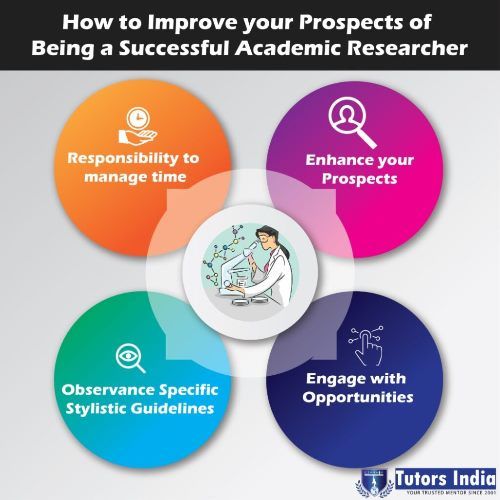How to Improve your Prospects of Being a Successful Academic Researcher
Pursuing a career in academic research is definitely rewarding, but at the same time, it can be immensely stressful. Even when it does not come with a secure salary, it gives a lot of autonomy to researchers who are at liberty to choose the hours they want to put in, the prospects they wish to pursue, and the research propositions they want to engage in. Having said that, it is their responsibility to manage time, and this can be certainly daunting. It is important know the
“How to be a successful Academic Researcher” to Enhance your Prospects.
The role of an academic researcher is such that they have to budget time for meetings, for performing administrative tasks, for teaching, and for submitting proposals. These are comparatively straightforward. In addition, they are required to consume new information, read journals, and articles, and attend lectures on a constant basis to stay up-to-date with the latest developments in their field. Thus, time management becomes crucial in knowing when to stop and where to draw the line.

With seemingly infinite tasks to perform learn to prioritize. Rather than looking at opportunities where other people are engaging you, examine your personal goals, and understand what is important to you. Do not chase opportunities or commit engagements which do not contribute to your own ambitions. Academic researchers have varied opportunities in the like of invitations to seminars and conferences, requests to contribute to publications or to be part of a new project., Examine whether these will lead to your goal or add value to it.

Engage with Opportunities
Secondly, it is the quality and not the quantity that matters. If you were to engage in too many opportunities, you tend to so by not engaging in any one of them in a meaningful manner.
Thirdly, and most importantly learn to outsource certain aspects of your work. You don’t have to take ownership of every part of your research process. When certain tasks are off-loaded, it means you can dedicate your time to areas where it adds value. For example, seek the services of a proofreader, who could help review the documents for grammar and punctuation issues, as well as help with structure or citations. This will also prove helpful in knowing and rectifying your weak areas. Also, your mind will beat ease that no simple mistakes have been accidentally missed before you submit your proposals.
Observance of Specific Stylistic Guidelines
Academic writing requires observance of specific stylistic guidelines that only seasoned writers would typically be aware of. Similarly, Subject matter experts can offer in-depth reviews on the strength of your arguments. Experts in the publishing process can also offer invaluable insights. This will not only save you time, but also alleviate stress down the line.
There are also online Academic Research paper help Uk services available that provide intuitive platforms for papers to be edited quickly and accurately. These proofreading services can streamline your workflow and help present best writing.
By putting together different academic research tools onto one cloud, you can be saved from the time and stress of handling several different sites for a single project. Such tools save most part of your time normally spent on administrative or formatting tasks, letting you to focus on research and writing instead. From referencing and collaborative editing, to journal summaries and reference databases, these online tools have revolutionized academic research and thus contribute immensely to time-management.
Adhering to personal goals, maintaining a healthy work-life balance, and knowing what to outsource are just a few tips and get the Academic or Analytical help for his fellow researchers to develop the highest quality work, and thus thrive in their discipline.
Reference:
- Castro, M. R., Van der Heijden, B., & Henderson, E. L. (2020). Catalysts in career transitions: Academic researchers transitioning into sustainable careers in data science. Journal of Vocational Behavior, 122, 103479.
- Wykes, T., Bell, A., Carr, S., Coldham, T., Gilbody, S., Hotopf, M., … & Creswell, C. (2021). Shared goals for mental health research: What, why and when for the 2020s. Journal of Mental Health, 1-9.
- Sharma, A., Rangarajan, D., & Paesbrugghe, B. (2020). Increasing resilience by creating an adaptive salesforce. Industrial Marketing Management, 88, 238-246.
- Thomas, R. (2020). Affective subjectivation or moral ambivalence? Constraints on the promotion of sustainable tourism by academic researchers. Journal of Sustainable Tourism, 1-14.

 Previous Post
Previous Post Next Post
Next Post